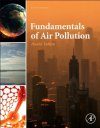![Fundamentals of Air Pollution Fundamentals of Air Pollution]()
Click to have a closer look
About this book
Contents
Biography
Related titles
Recommended titles
About this book
Fundamentals of Air Pollution is an important and widely used textbook in the environmental science and engineering community. Written shortly after the passage of the seminal Clean Air Act Amendments of 1990, the third edition was quite timely. Surprisingly, the text has remained relevant for university professors, engineers, scientists, policy makers and students up to recent years. However, in light of the transition in the last five years from predominantly technology-based standards (maximum achievable control technologies or MACTs) to risk-based regulations and air quality standards, the text must be updated significantly. The fourth edition will be updated to include numerous MACTs which were not foreseen during the writing of the third edition, such as secondary lead (Pb) smelting, petroleum refining, aerospace manufacturing, marine vessel loading, ship building, printing and publishing, elastomer production, offsite waste operations, and polyethylene terephthalate polymer and styrene-based thermoplastic polymers production. Overall, revisions will reflect the numerous changes in the understanding of air pollution and the development of new technologies that has occurred in the past twelve years.
Contents
Part I: Air Pollution Essentials
- The History of Air Pollution
- The Natural versus Polluted Atmosphere
- The Philosophy of Air Pollution
- Control Sources of Air Pollution
Part II: The Risks of Air Pollution
- Effects on Human Health and Welfare
- Effects on Vegetation and Animals
- Effects on Materials and Structures
- Effects on the Atmosphere, Soil, and Water Bodies
- Long-Term Effects on the Planet
Part III: Measurement and Monitoring of Air Pollution
- Atmospheric Chemistry
- Ambient Air Sampling
- Federal Reference Methods (FRM)
- Ambient Air Pollutants: Analysis and Measurement
- Air Pollution Monitoring and Surveillance
- Air Pathways from Hazardous Waste Sites
Part IV: The Meteorology of Air Pollution
- The Physics of the Atmosphere
- The Meteorological Bases of Atmospheric Pollution
- Air Pollution Climatology
Part V: Modeling Air Pollution
- Modeling Approaches
- Fate and Transport of Air Pollutants
- Modeling Exposures
- Computational Fluid Dynamics (first principles)
- Scale and Time
Part VI: The Regulatory Control of Air Pollution
- Air Quality Criteria and Standards
- Indoor Air Quality
- The U.S. Clean Air Act Amendments of 1990
- Emission Standards
- The Elements of Regulatory Control
- Organizations for Air Pollution Control
- International Air Pollution Control
Part VII: The Engineering Control of Air Pollution
- Engineering Control Concepts
- Control Devices and Systems
- Control of Stationary Sources
- Control of Mobile Sources
- Point of Use and Control of Indoor Sources
- Source Sampling and Monitoring
Chapter References
Suggested Reading
Questions
Subject Index
Customer Reviews
Biography
Dan Vallero is an internationally recognized expert in the transport, chemical transformation and environmental fate of hazardous pollutants. His three decades of professional experience in hazardous waste engineering and management have included research, teaching and regulatory advice related to a wide range of human health risk and ecological issues, from global climate change to the release of hazardous products of incomplete combustion from waste incinerators to the assessment of the risks from exposures to environmental endocrine disruptors. Dr. Vallero recently established the Engineering Ethics program at Duke University. This innovative program introduces students to the complex relationships between science, technology and societal demands on the engineer. The lessons learned from the cases in this book are a fundamental part of Dukes preparation of its future engineers to address the ethical dilemmas likely to be encountered during the careers of the next generation engineers.
































